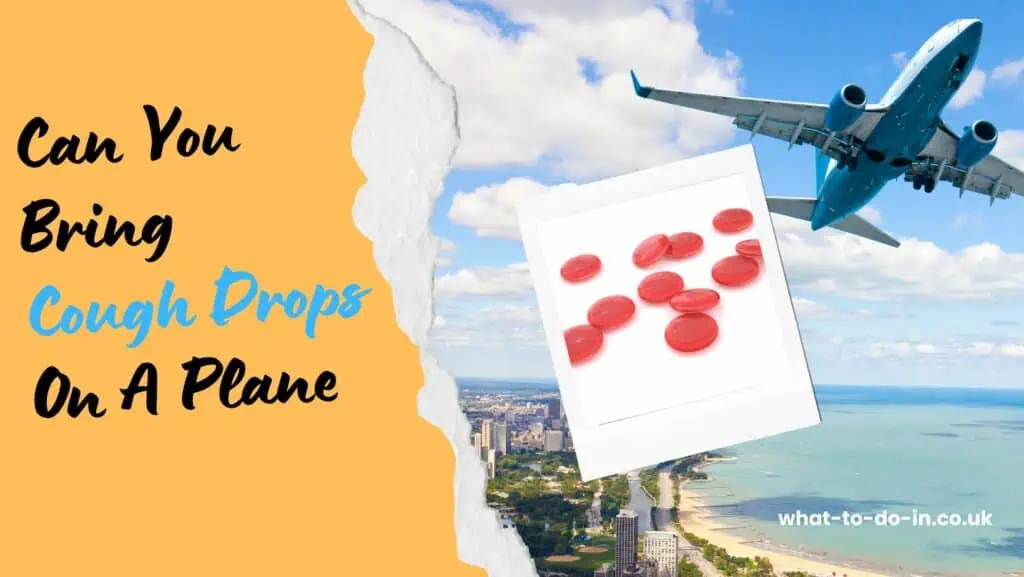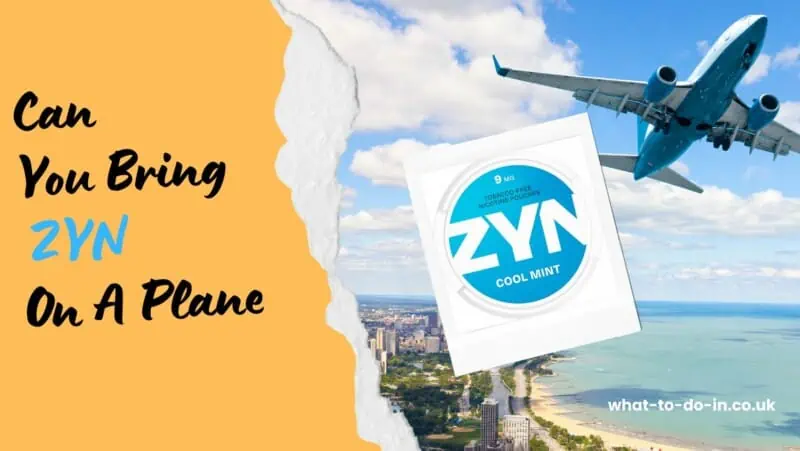Traveling can be stressful, more so if you’re feeling under the weather. Cough drops, also known as throat lozenges, have been a go-to remedy for temporary relief of coughs and sore throats for well over a century. These small, medicated tablets dissolve slowly in the mouth to soothe irritated tissues, providing comfort to millions of people, including travelers.
Understanding what you can and cannot bring on a plane is crucial for a hassle-free travel experience. The regulations about carrying medications, including cough drops, during air travel have evolved over the years, especially with heightened security measures put in place post-9/11. Air travel security, primarily administered by agencies like the Transportation Security Administration (TSA) in the United States, walks a fine line between ensuring passenger safety and accommodating personal health needs.
Nowadays, passengers are increasingly concerned about health issues when flying, given the close quarters and shared air within an airplane cabin. As a result, items like cough drops have garnered attention as travelers seek to mitigate discomfort and alleviate symptoms of colds or flu without running afoul of carry-on restrictions. Understanding these regulations helps ensure that passengers can keep these simple remedies on hand to manage their symptoms during their journeys.
Can You Take Cough Drops On A Plane?
Traveling with medications or health-related items often brings up questions about what is permissible on an airplane. When it comes to cough drops, passengers are generally allowed to take them on a plane. These over-the-counter throat lozenges are considered essential for those suffering from a cough or sore throat and do not fall under the restrictions typically associated with liquids or gels. This means you can keep them in your carry-on or checked luggage without any issues. For those traveling with a cold or just wanting to soothe their throat, having cough drops on hand can make the journey more comfortable. In the following sections, we will delve deeper into the guidelines for traveling with medication and provide detailed information on how to pack and declare health-related items to ensure a smooth security check process at the airport.
Cough Drops on USA Domestic Flights: TSA Guidelines
When traveling on domestic flights within the United States, passengers often have questions about what they can bring onboard, specifically when it comes to medication and health-related items such as cough drops. According to the Transportation Security Administration (TSA) guidelines, travelers are allowed to bring cough drops in their carry-on bags without any restrictions. Cough drops are considered a solid and aren’t subject to the liquids rule.
To find the most current information and for any updates on carrying medications, including cough drops on flights, passengers should visit the official TSA website or use the TSA’s “What Can I Bring?” tool for the most authoritative guidance.
Packing Cough Drops in Carry-On Bags
- No Quantity Restrictions: Carry an adequate supply of cough drops for the journey; there are no quantity limitations.
- Accessibility: Keep them in an easily accessible place in your carry-on bag for use during the flight.
- Original Packaging: While not required, maintaining cough drops in their original packaging can expedite the screening process.
Packing Cough Drops in Checked Luggage
- Unlimited Quantity: There is no limit to the number of cough drops you can pack in your checked luggage.
- Packaging: It’s advised to pack them in a sealed bag or container to prevent any damage or contamination.
Tips for Traveling with Cough Drops
- Ensure Freshness: Check the expiration date to ensure they are fresh and effective for use during your travels.
- Avoid Spillage: To prevent cough drop wrappers from littering your bag, consider using a small pill case or baggie.
- Medicated Cough Drops: For cough drops containing medication, it’s prudent to bring a copy of the prescription or a doctor’s note, especially in large quantities.
Other Considerations for Travel with Medication
When traveling with medication, including medicated cough drops, it’s important to be aware of regulations and best practices:
- Keep medication, including cough drops, in carry-on luggage in case of the need for immediate access.
- Be prepared to show the medications to the TSA officer at the checkpoint if requested.
- If you are traveling with liquid medication, inform the TSA officer before the screening process begins as different rules may apply.
- Review the TSA’s guidelines on traveling with medications for a hassle-free security check experience.
The information provided here is designed to assist travelers in preparing for their flight. However, security measures are subject to change, and travelers should always verify the latest TSA guidelines and airline policies before their trip.
Here’s a basic HTML table that lists the pros and cons of bringing cough drops on a plane:
| ✔ Pros | ✖ Cons |
|---|---|
| Helps soothe sore throats during flights | May require additional screening if in large quantities |
| Can provide comfort from dry airplane air | Some countries have restrictions on bringing medicine without a prescription |
| Generally allowed in hand luggage and checked bags | Potential for mess if they melt or become sticky |
| No liquid restrictions like other medications | Could be mistaken for candies by children, posing a choking risk |
International Air Transport Association (IATA) Guidelines
The International Air Transport Association (IATA) provides guidelines for the carriage of medications and medical supplies, which generally include cough drops. According to IATA, passengers are allowed to carry medications for personal use in their carry-on luggage. However, IATA itself does not have specific guidelines for cough drops, as they are not considered dangerous goods or require special handling. Passengers are advised to follow the general rules for non-prescription medications and to ensure that they comply with the regulations of the departure, transit, and arrival countries.
- Medications should be kept in original packaging.
- Passengers should have a clear understanding of the quantity allowed for personal use.
- It is advisable to have a doctor’s note for any medication, though not mandatory for cough drops.
For more detailed information, passengers should consult the IATA’s Dangerous Goods Regulations or contact their airline directly.
Country Specific Regulations
When flying internationally with cough drops, it is crucial to be aware of the country-specific regulations that may affect the transport of these items. Each country has its own set of rules regarding the importation of over-the-counter medications, including cough drops. These regulations are designed to prevent the illegal trafficking of drugs and to ensure the safety and well-being of travelers.
United Kingdom
- Cough drops are generally allowed for personal use.
- No specific mention of cough drops on the UK government website.
Europe
- Medications for personal use, including cough drops, can be carried in hand luggage.
- For more information, refer to the European Commission’s mobility and transport page.
Canada
- Travelers can bring cough drops into Canada without special restrictions.
- The Canada Border Services Agency (CBSA) does not list cough drops as a concern.
Australia
- The Australian Government’s Department of Home Affairs allows non-prescription medications like cough drops.
- Items should be for personal use and in original packaging.
New Zealand
- Cough drops are not listed as restricted or prohibited items by the New Zealand Customs Service.
- Passengers should declare any medication upon arrival.
Asia
- Regulations vary by country; passengers should check with the specific country’s customs regulations.
- Generally, personal medications like cough drops are permitted.
Singapore
- The Health Sciences Authority (HSA) of Singapore allows over-the-counter medications for personal use.
- Cough drops do not require prior approval or special declaration.
10 Airline-Specific Regulations for Flying with Cough Drops
Airlines often have their own specific regulations regarding the transport of medications and medical supplies, including cough drops. While most airlines follow general international guidelines, it is important for passengers to review the airline’s specific policies to avoid any inconvenience during their travel. Below are the regulations from 10 different airlines concerning the carriage of cough drops.
American Airlines
- Cough drops are allowed in carry-on bags without restrictions.
Delta Air Lines
- Non-prescription medications like cough drops can be carried on board.
United Airlines
- United permits cough drops in both carry-on and checked bags.
Southwest Airlines
- Travelers can bring cough drops on their flights without special arrangements.
British Airways
- Cough drops are not subject to any specific restrictions on British Airways flights.
Lufthansa
- Passengers are allowed to carry cough drops in their hand luggage.
Air Canada
- Cough drops can be taken on board without any issues.
Qantas
- Qantas does not list cough drops as restricted items for carry-on or checked luggage.
Air New Zealand
- Cough drops are permitted on Air New Zealand flights in both carry-on and checked baggage.
Singapore Airlines
- Passengers can bring cough drops on their flight with Singapore Airlines.
Packing Cough Drops for Carry-On Luggage
When traveling by air, it’s essential to be aware of the regulations for carry-on luggage to ensure a smooth security check-in process. Cough drops are typically considered a non-liquid item, so they shouldn’t pose any problems with TSA liquid restrictions.
- Choose a resealable plastic bag or a small container to store the cough drops. This will help keep them fresh and prevent them from contaminating other items in your bag.
- Place the container of cough drops in an easily accessible pocket of your carry-on luggage. This is convenient in case you need to use them during the flight.
- If the cough drops are in a sealed bag or original packaging, leave them unopened to avoid any unnecessary questions during the security check.
- Consider the quantity you pack; only take as many as you will need for the duration of your trip to save space.
Packing Cough Drops for Hold Luggage
While packing for hold luggage allows more flexibility, cough drops should still be packed properly to prevent any issues upon arrival.
- Store cough drops in their original packaging if possible. This not only helps with organization but also avoids any concerns during any inspections.
- Consider packing cough drops in a hard case or sturdy box within your hold luggage to prevent them from getting crushed by other items.
- If you are bringing a large quantity, make sure it complies with customs regulations of your destination country.
Ensuring that your cough drops are securely packed protects them from damage and makes your travel experience hassle-free.
Essential Items for Air Travel Comfort
When preparing for a flight, alongside cough drops to soothe your throat, consider packing a few additional items to enhance your comfort. Earplugs or noise-cancelling headphones are a must to block out the engine noise and chatter, ensuring a more peaceful journey. A travel pillow can provide necessary neck support, preventing stiffness during long flights. For maintaining hygiene, hand sanitizer and disinfecting wipes are indispensable for sanitizing your hands and tray table. To combat dry cabin air, a small bottle of saline nasal spray and moisturizing lip balm can prevent discomfort. Lastly, don’t forget to bring a water bottle to stay hydrated, as well as some healthy snacks to keep hunger at bay without relying on limited airplane food options.
FAQ’s About Can You Bring Cough Drops On A Plane?
When you’re preparing for air travel, you might wonder what items are permissible to bring on board, especially when you’re not feeling 100%. Cough drops are a common item that travelers like to carry with them, but there can be some questions about the regulations surrounding them. Below is a collection of frequently asked questions that address common concerns regarding traveling with cough drops on an airplane.
Are cough drops considered a liquid by airport security?
No, cough drops are not considered a liquid. They are solid items and can be brought onto a plane without adhering to the liquids rule that applies to carry-on baggage.
Can I bring cough drops in my carry-on luggage?
Yes, you can bring cough drops in your carry-on luggage. There is no limit to the quantity you can carry with you in your carry-on bag.
Do I need to declare cough drops when going through airport security?
No, you do not need to declare cough drops when going through security. They are not a restricted item, and security officers are familiar with such over-the-counter medications.
Is there a limit to the number of cough drops I can bring on a plane?
There is no specific limit to the number of cough drops you can bring on a plane, but it’s always recommended to bring only what you might reasonably need for the duration of your trip.
Can I bring medicated cough drops on a plane?
Yes, medicated cough drops are allowed on a plane just like regular cough drops. There is no distinction between them for the purposes of air travel.
Do cough drops need to be in their original packaging?
While it is not a requirement, it’s advisable to keep cough drops in their original packaging to avoid any confusion or issues during the security screening process.
Will cough drops count towards my carry-on liquid/gel limit?
No, because cough drops are not in liquid or gel form, they will not count against your carry-on liquid/gel limit.
I have liquid cough syrup; can I bring that on a plane as well?
Yes, you can bring liquid cough syrup, but it must comply with the TSA’s liquids rule. It must be in a container of 3.4 ounces (100 milliliters) or less and placed in a clear, quart-sized bag with your other liquids.
Are cough drops with CBD or THC allowed on a plane?
Cough drops containing CBD are allowed as long as they contain less than 0.3% THC on a dry weight basis. However, any products containing THC are federally illegal to transport across state lines and thus not allowed on planes.
Can I use cough drops during the flight?
Yes, you can use cough drops during the flight. They can help soothe your throat and mitigate coughing, which can be beneficial for both you and fellow passengers.
Packing It All Up
Cough drops are generally permissible on planes, both in carry-on luggage and checked baggage without significant restrictions. The Transportation Security Administration (TSA) does not specifically limit the quantity of cough drops one can bring onboard; thus, passengers can pack enough to manage their symptoms throughout the flight. However, while these items are not classified as liquids, it’s wise to remember that TSA’s liquid rules apply if the cough drops are in syrup or gel form. In such cases, they need to be contained in bottles of 3.4 ounces (100 milliliters) or less and placed within a quart-sized resealable bag.
It’s also essential to consider the policies of individual airlines, as they may have their unique guidelines. For international travel, the restrictions can vary by destination, and it’s vital to be aware of the laws related to medication importation. Passengers with prescription cough drops should have appropriate documentation to avoid any potential complications. For convenience and ease of access during the flight, travelers should keep their cough drops in a pocket or a separate compartment within their carry-on. By following these straightforward guidelines, passengers can ensure they have a smooth and comfortable flight experience, all while keeping their cough at bay.






